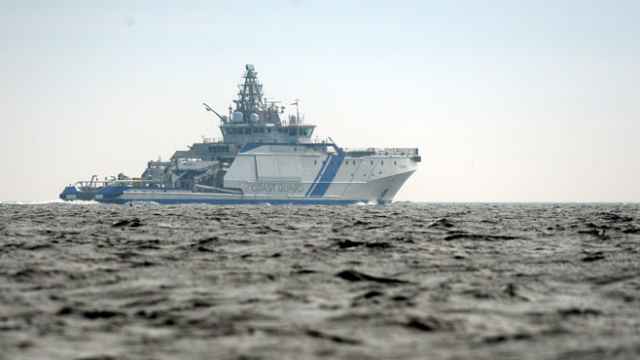VISBY FORWARD OPERATING BASE, Sweden — A daily game of Cold War cat-and-mouse is ratcheting up tensions in the Baltic and drawing the biggest military presence into the region for over 20 years, Swedish military officials say.
Eye-to-eye encounters with Russian combat jets and reports of suspected submarines in Swedish and Finnish waters are fueling regional concerns about Russian assertiveness in the wake of the Ukraine crisis and reversing years of defense cuts.
Western officials say Russia has stepped up probing flights and mock bomb runs near Europe's borders since 2013, forcing jets from NATO nations and non-NATO allies like Sweden to scramble repeatedly. For its part, Moscow says NATO has dramatically increased reconnaissance flights near its borders.
After the fall of the Berlin Wall in 1989, the Baltic island of Gotland, for decades Sweden's front line of defense against the Soviet Union, was all but abandoned by the military to the tourists visiting the walled medieval town of Visby.
Now, two JAS 39C Gripen combat jets are on Quick Reaction Alert (QRA) at the nearby “forward operating” air base and Sweden plans to reopen a permanent army garrison on the island.
"I did my first QRA here in 1988, chasing not Russian but Soviet aircraft with Red stars on the fins," Colonel Marcus Bjorkgren, chief of staff of the Swedish Air Force, said.
"A couple of years later there was absolutely nothing in the Baltics. We begged controllers to scramble us just so pilots could see something and most often it was a German signals intelligence aircraft. We filed reports and that was that."
Last year, however, Swedish fighters, early warning aircraft and reconnaissance planes flew over 600 missions, up almost half from post-Cold War levels seen five years earlier.
The Saab Gripens are used to do reconnaissance, collect signals, fill gaps in radar or simply display force.
"You don't provoke each other, but you keep a close eye and show your presence," Bjorkgren said.
Cold War Levels
The amount of regional military activity is back at Cold War levels, he said, with NATO aircraft also crowding into the region on Baltic air policing missions. "We are back pretty much on the level where we were in the late 1980s and early 1990s."
The European Aviation Safety Agency has said safety incidents involving civil and "non-cooperative" military aircraft over the high seas, particularly over the Baltic Sea, significantly increased in 2014. In the first three months of 2015, NATO aircraft intercepted Russian planes more than 100 times all over Europe, a NATO official said.
Sweden has drawn closer to NATO in the past few years but Prime Minister Stefan Lofven has ruled out seeking membership of the U.S.-led alliance.
The deployments highlight the strategic importance of the Baltic, an economically important trading zone for 90 million people, still littered with mines from two world wars.
Lithuania last week said Russian ships where disturbing the laying of an underwater power cable connecting its grid to Sweden. Moscow said it was protecting military exercise areas.
Deeper and more clandestine rivalries are being played out under the Baltic Sea, a harsh and complex environment for underwater warfare.
Last week the Finnish military said it had fired handheld underwater depth charges as a warning against a suspected Russian submarine in waters near Helsinki.
The incident came months after Sweden's biggest mobilization since the Cold War, when stealth ships and helicopters scoured the Stockholm archipelago after reports of underwater activity.
"We have 100 percent proof that at least one submarine or underwater vehicle came far into Swedish territory," said Rear Admiral Jan Thornqvist, chief of staff of the Swedish navy, adding a report on the October incident would be published soon.
Russia's Defense Ministry mocked the Swedish report, saying there was no chance of Sweden finding a “Russian trace” there.
Back to the 1980s
Sweden says the suspected incursion was the most serious incident in its waters since a Soviet sub ran aground near a naval base in the "Whiskey on the Rocks" incident in 1981.
Today, the rocky island where the stranded Whiskey-class submarine provoked a 10-day diplomatic stand-off is marked by a mock road-traffic sign prohibiting submarines.
But policing Sweden's maze of narrow inlets is a huge task.
Sweden's own military has questioned its ability to defend itself for more than a week against a Russian attack.
"We realize we are back more or less to the scenario as it appeared in the 1980s and early 1990s and have to be able to handle that kind of threat," Thornqvist told reporters.
After 20 years of reduced or stagnant spending, Sweden is increasing its defense budget by 10.2 billion Swedish crowns over the next five years in a deal supported by parties on both sides of the political aisle in the Riksdag, where once-vocal opposition to higher military spending has largely faded.
Finland, Norway, Poland and the former-Soviet Baltic States are following suit.
The immediate impact will be on regional demand for air and naval systems, said defense analyst Francis Tusa.
"Especially in Sweden they are realizing their navy was run down almost catastrophically over the last 10 years and that is being reversed," Tusa said.
"If you were to ask for the order of priority in terms of getting things into service, it is air, naval and then land."
The Swedish navy, with five radar-evading Visby-class corvettes, is still regarded as skilled in anti-submarine warfare and a leader in tactics and surface-ship stealth.
But it stands at 25 percent of its Cold War strength, Thornqvist said, warning further cuts would be "disastrous."
"It is state of the art; however … you can almost put it one pocket. There are not many ships but capacity is impressive."
A Message from The Moscow Times:
Dear readers,
We are facing unprecedented challenges. Russia's Prosecutor General's Office has designated The Moscow Times as an "undesirable" organization, criminalizing our work and putting our staff at risk of prosecution. This follows our earlier unjust labeling as a "foreign agent."
These actions are direct attempts to silence independent journalism in Russia. The authorities claim our work "discredits the decisions of the Russian leadership." We see things differently: we strive to provide accurate, unbiased reporting on Russia.
We, the journalists of The Moscow Times, refuse to be silenced. But to continue our work, we need your help.
Your support, no matter how small, makes a world of difference. If you can, please support us monthly starting from just $2. It's quick to set up, and every contribution makes a significant impact.
By supporting The Moscow Times, you're defending open, independent journalism in the face of repression. Thank you for standing with us.
Remind me later.





